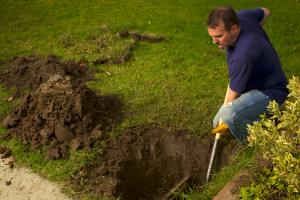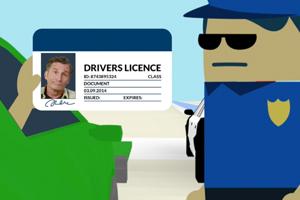Safety tips for spring yard work

Warm weather calls for the spring cleanup of lawns and gardens. While yard work may seem simple to complete, it’s important to consider safety risks that can occur, including muscle strains, falls, cuts, burns, insect bites and stings, dehydration, hearing damage and electrocution. Each year, an estimated 143,000 people are hospitalized for injuries related to using lawn and garden tools, many of which are completely preventable when the right precautions are taken.
Follow these safety tips to learn how to prevent yard work-related injuries throughout the spring season.
Before you begin
- Warm up and stretch adequately to prevent pulled muscles and joint pain.
- Wear lightweight protective clothing such as gloves, long-sleeved shirts, long pants, socks and slip-resistant shoes. Light-colored clothing makes ticks and other insects more visible.
- Apply a water-resistant sunscreen with an SPF of 30 or higher to any exposed skin. Wear a wide-brimmed hat and sunglasses with UV protection to help shield you from the sun’s rays.
- Apply insect repellent to exposed skin and clothing to prevent insect bites and stings.
- Drink water often and keep plenty nearby.
- Have a first-aid kit and emergency medical numbers ready in your home.
- Check for storm warnings and other weather alerts in your area.
While you're working
- Never use electric lawn or garden equipment in wet conditions.
- Remove debris from the lawn such as rocks, metals, glass, sticks and branches before mowing.
- For gas-powered mowers, add gas outdoors when the engine is off and has cooled.
- Avoid slippery or uneven surfaces when carrying yard equipment or debris.
- Use a wheelbarrow when transporting heavy loads – trying to lift them yourself can result in a serious injury.
- Wear safety goggles or safety glasses with side shields when using power tools and lawn and garden chemicals.
- Wear ear plugs while using noisy equipment such as a lawn mower.
- When using a ladder, practice safe placement and avoid areas with obstructions including overhead wires and tree branches.
- Make sure power tools are in the “off” position before plugging them in.
- During weed removal, avoid areas with poison ivy and other toxic plants. If exposure occurs, shower immediately and wash the exposed area with soap.
- Never leave tools unattended or equipment operational.
- Stay hydrated and reapply sunscreen at least every couple of hours.
Practice safe cleanup
- Keep children and pets away from the lawn after a chemical treatment is applied. Store chemicals in a locked and ventilated space that is out of their reach.
- Unplug any tools that are not being used and make sure they are in the “off” position.
- Wrap hoses tightly and tuck them away after use. Let them dry completely before storing.
- Lay ladders on their sides and rakes with the tines facing down.
Sources
Related resources
Safety tips for spring yard work
Warm weather calls for the spring cleanup of lawns and gardens. While yard work may seem simple to complete, it’s important to consider safety risks that can occur, including muscle strains, falls, cuts, burns, insect bites and stings, dehydration, hearing damage and electrocution. Each year, an estimated 143,000 people are hospitalized for injuries related to using lawn and garden tools, many of which are completely preventable when the right precautions are taken.
Follow these safety tips to learn how to prevent yard work-related injuries throughout the spring season.
Before you begin
- Warm up and stretch adequately to prevent pulled muscles and joint pain.
- Wear lightweight protective clothing such as gloves, long-sleeved shirts, long pants, socks and slip-resistant shoes. Light-colored clothing makes ticks and other insects more visible.
- Apply a water-resistant sunscreen with an SPF of 30 or higher to any exposed skin. Wear a wide-brimmed hat and sunglasses with UV protection to help shield you from the sun’s rays.
- Apply insect repellent to exposed skin and clothing to prevent insect bites and stings.
- Drink water often and keep plenty nearby.
- Have a first-aid kit and emergency medical numbers ready in your home.
- Check for storm warnings and other weather alerts in your area.
While you're working
- Never use electric lawn or garden equipment in wet conditions.
- Remove debris from the lawn such as rocks, metals, glass, sticks and branches before mowing.
- For gas-powered mowers, add gas outdoors when the engine is off and has cooled.
- Avoid slippery or uneven surfaces when carrying yard equipment or debris.
- Use a wheelbarrow when transporting heavy loads – trying to lift them yourself can result in a serious injury.
- Wear safety goggles or safety glasses with side shields when using power tools and lawn and garden chemicals.
- Wear ear plugs while using noisy equipment such as a lawn mower.
- When using a ladder, practice safe placement and avoid areas with obstructions including overhead wires and tree branches.
- Make sure power tools are in the “off” position before plugging them in.
- During weed removal, avoid areas with poison ivy and other toxic plants. If exposure occurs, shower immediately and wash the exposed area with soap.
- Never leave tools unattended or equipment operational.
- Stay hydrated and reapply sunscreen at least every couple of hours.
Practice safe cleanup
- Keep children and pets away from the lawn after a chemical treatment is applied. Store chemicals in a locked and ventilated space that is out of their reach.
- Unplug any tools that are not being used and make sure they are in the “off” position.
- Wrap hoses tightly and tuck them away after use. Let them dry completely before storing.
- Lay ladders on their sides and rakes with the tines facing down.
Sources
Related resources
Safety tips for spring yard work
Warm weather calls for the spring cleanup of lawns and gardens. While yard work may seem simple to complete, it’s important to consider safety risks that can occur, including muscle strains, falls, cuts, burns, insect bites and stings, dehydration, hearing damage and electrocution. Each year, an estimated 143,000 people are hospitalized for injuries related to using lawn and garden tools, many of which are completely preventable when the right precautions are taken.
Follow these safety tips to learn how to prevent yard work-related injuries throughout the spring season.
Before you begin
- Warm up and stretch adequately to prevent pulled muscles and joint pain.
- Wear lightweight protective clothing such as gloves, long-sleeved shirts, long pants, socks and slip-resistant shoes. Light-colored clothing makes ticks and other insects more visible.
- Apply a water-resistant sunscreen with an SPF of 30 or higher to any exposed skin. Wear a wide-brimmed hat and sunglasses with UV protection to help shield you from the sun’s rays.
- Apply insect repellent to exposed skin and clothing to prevent insect bites and stings.
- Drink water often and keep plenty nearby.
- Have a first-aid kit and emergency medical numbers ready in your home.
- Check for storm warnings and other weather alerts in your area.
While you're working
- Never use electric lawn or garden equipment in wet conditions.
- Remove debris from the lawn such as rocks, metals, glass, sticks and branches before mowing.
- For gas-powered mowers, add gas outdoors when the engine is off and has cooled.
- Avoid slippery or uneven surfaces when carrying yard equipment or debris.
- Use a wheelbarrow when transporting heavy loads – trying to lift them yourself can result in a serious injury.
- Wear safety goggles or safety glasses with side shields when using power tools and lawn and garden chemicals.
- Wear ear plugs while using noisy equipment such as a lawn mower.
- When using a ladder, practice safe placement and avoid areas with obstructions including overhead wires and tree branches.
- Make sure power tools are in the “off” position before plugging them in.
- During weed removal, avoid areas with poison ivy and other toxic plants. If exposure occurs, shower immediately and wash the exposed area with soap.
- Never leave tools unattended or equipment operational.
- Stay hydrated and reapply sunscreen at least every couple of hours.
Practice safe cleanup
- Keep children and pets away from the lawn after a chemical treatment is applied. Store chemicals in a locked and ventilated space that is out of their reach.
- Unplug any tools that are not being used and make sure they are in the “off” position.
- Wrap hoses tightly and tuck them away after use. Let them dry completely before storing.
- Lay ladders on their sides and rakes with the tines facing down.
Sources
Related resources
Safety tips for spring yard work
Warm weather calls for the spring cleanup of lawns and gardens. While yard work may seem simple to complete, it’s important to consider safety risks that can occur, including muscle strains, falls, cuts, burns, insect bites and stings, dehydration, hearing damage and electrocution. Each year, an estimated 143,000 people are hospitalized for injuries related to using lawn and garden tools, many of which are completely preventable when the right precautions are taken.
Follow these safety tips to learn how to prevent yard work-related injuries throughout the spring season.
Before you begin
- Warm up and stretch adequately to prevent pulled muscles and joint pain.
- Wear lightweight protective clothing such as gloves, long-sleeved shirts, long pants, socks and slip-resistant shoes. Light-colored clothing makes ticks and other insects more visible.
- Apply a water-resistant sunscreen with an SPF of 30 or higher to any exposed skin. Wear a wide-brimmed hat and sunglasses with UV protection to help shield you from the sun’s rays.
- Apply insect repellent to exposed skin and clothing to prevent insect bites and stings.
- Drink water often and keep plenty nearby.
- Have a first-aid kit and emergency medical numbers ready in your home.
- Check for storm warnings and other weather alerts in your area.
While you're working
- Never use electric lawn or garden equipment in wet conditions.
- Remove debris from the lawn such as rocks, metals, glass, sticks and branches before mowing.
- For gas-powered mowers, add gas outdoors when the engine is off and has cooled.
- Avoid slippery or uneven surfaces when carrying yard equipment or debris.
- Use a wheelbarrow when transporting heavy loads – trying to lift them yourself can result in a serious injury.
- Wear safety goggles or safety glasses with side shields when using power tools and lawn and garden chemicals.
- Wear ear plugs while using noisy equipment such as a lawn mower.
- When using a ladder, practice safe placement and avoid areas with obstructions including overhead wires and tree branches.
- Make sure power tools are in the “off” position before plugging them in.
- During weed removal, avoid areas with poison ivy and other toxic plants. If exposure occurs, shower immediately and wash the exposed area with soap.
- Never leave tools unattended or equipment operational.
- Stay hydrated and reapply sunscreen at least every couple of hours.
Practice safe cleanup
- Keep children and pets away from the lawn after a chemical treatment is applied. Store chemicals in a locked and ventilated space that is out of their reach.
- Unplug any tools that are not being used and make sure they are in the “off” position.
- Wrap hoses tightly and tuck them away after use. Let them dry completely before storing.
- Lay ladders on their sides and rakes with the tines facing down.





